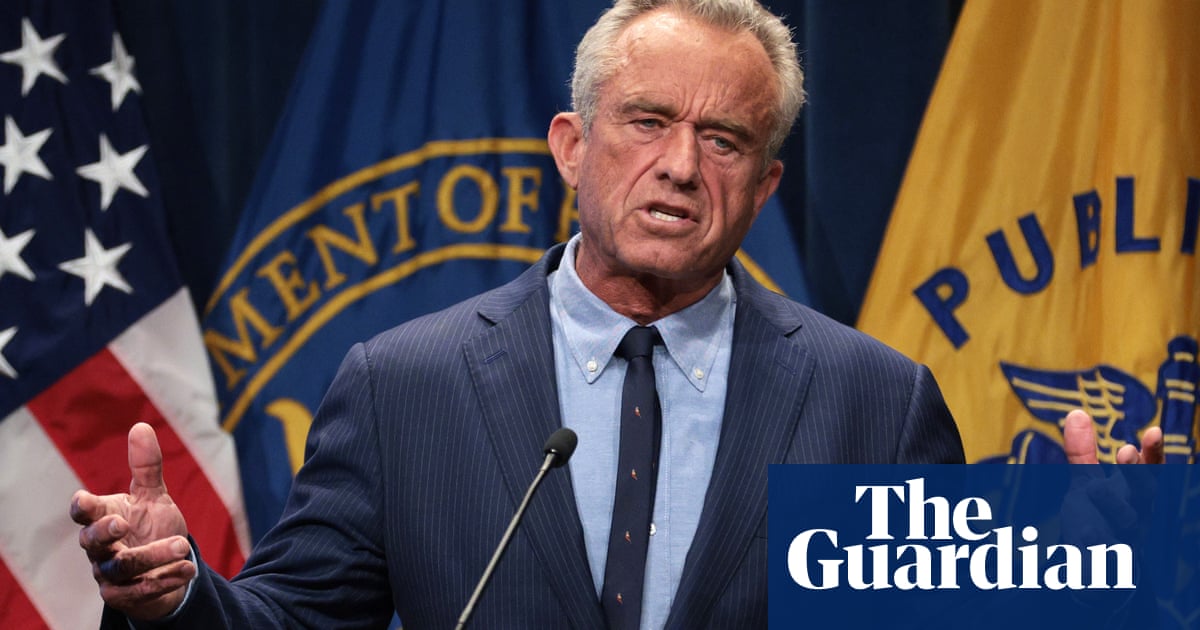Autism experts and autistic people are pushing back on Robert F Kennedy’s “terrible” approach to autism as the health secretary plans more expansive monitoring of autistic people’s health records and proposes cuts to disability services.
A huge study on autism proposed by Kennedy will draw upon private medical records from federal and commercial databases, and a new health registry will track autistic Americans, CBS Newsreportedon Monday.
A draft of proposed cuts to the US Department of Health and Human Services (HHS), leaked on Wednesday, would alsoeliminatesupport for people with disabilities in the US, including education, research and services.
“It’s going to have an enormous chilling effect,” said Daniel Geschwind, professor and director of the UCLA Center for Autism Research and Treatment.
Researchers were “poised to make big advances in autism”, yet these cuts and harmful approaches will make those advances “stop in their tracks”, he said.
The moves come after Kennedyclaimed incorrectly, in his first press conference as health secretary last week, that autistic people do not contribute to society or lead fulfilled lives and that autism “destroys” families.
Researchers say a lack of support, including the Trump administration’s proposed and existing cuts to health insurance, research and special education, are the real challenges for individuals and families living with autism.
“There’s a larger erosion of rights for people with autism and people with disabilities,” said Dora Raymaker, a research associate professor focused on autism at Portland State University.
The Trump administration has halted key research on autism through itsbanon research and services related to diversity, equity, inclusion and accessibility.
“The withdrawal of funding for research is going to dramatically slow down the acquisition of new knowledge,” said Stephen Shore, professor of special education at Adelphi University of New York.
About 15 million people with disabilitiesrelyon Medicaid in the US, yet the Republican-controlled Congress has proposed slashing Medicaid by nearly a third over the next decade.
The Trump administration has also proposed cuts to the Department of Education, which supports more than 7 million disabled students. Trump hassaidKennedy will oversee services for students with disabilities, an unusual switch from the education department to HHS.
“That is going to present a major challenge to special education,” Shore said. “We stand to lose as much as half a century of progress.” The Individuals with Disabilities Education Act was first enacted in 1974.
One in 31 eight-year-olds received an autism diagnosis as of 2022, according to a newstudyby the US Centers for Disease Control and Prevention (CDC).
The report noted that the slight rise in diagnoses is due to improvements in diagnosing autism, though it remainsunder-diagnosed, and more awareness of what autism is – contradicting Kennedy’s claims.
In a 10 April cabinet meeting, Kennedy unveiled “a massive testing and research effort” for autism.
“By September, we will know what has caused the autism epidemic and we’ll be able to eliminate those exposures,” he said.
He hired David Geier to oversee the research attempting to link autism to vaccination, especially to the measles, mumps and rubella (MMR) vaccine. In 2011, the state of Marylandfoundthat Geier was practicing medicine without a license, including prescribing medications to block puberty among autistic children.
While it was reasonable to investigate whether vaccines had a role in autism, “the question has been asked and answered many dozens of times,” said Geschwind.
Instead, genetics underlie about 95% of autism cases,researchshows.
“The evidence is overwhelming,” Geschwind said. Inherited genetic factors contribute at least 80%, and another 10 to 15% are attributed to non-inherited genetic factors, he said.
And while autism is often diagnosed in early childhood – around the same time that children receive routine vaccinations – it develops in utero during fetal brain development.
In that time, “there’s very, very little room for what are called ‘maternal’ or ‘shared environmental effects’,” Geschwind said.
One of the rare non-genetic factors that may lead to autism is infection with rubella during pregnancy. Rubella is one of the three viruses prevented by the MMR vaccine currently targeted by Kennedy.
Yet Kennedy has pointed to an “environmental toxin” causing an “epidemic” of “preventable disease”, and he hasclaimedthat it “dwarfs” the Covid pandemic.
But autism spectrum disorder is a neurological and developmental disorder, not a disease. It “affects how people interact with others, communicate, learn, and behave”,accordingto the US National Institutes of Health.
“Epidemic” is also an “alarmist” and inaccurate word to use, said Shore. The word usually refers to infectious diseases that progressively worsen over the course of illness.
“It’s a lack of awareness on his part as to who autistic people are,” said Shore, who is autistic, ofKennedy’s characterizations of autistic people.
“It feels terrible. It’s attacking me – they’re attacking autistic individuals for no reason at all. Autistic people have a lot to contribute to society. The focus should be on the need to support autistic individuals and people with special needs in general.”
Scapegoating autistic individuals, like attacks on trans people, was “using people’s fear of something” to “advance some other agenda”, said Raymaker, who is autistic.
There are immediate harms – “people feel awful,” she said. “You can terrify people, you can oppress them,” she said. But at the same time, “you can’t unwind” the progress made over recent decades toward understanding and supporting autistic people, she said.
Responding to Kennedy’s comments “is like being asked to react to somebody who is a flat-Earther or somebody who believes in a pre-Copernican theory of planetary motion”, she said. “It’s hard to respond to something that is fiction.
“What is this distracting us from?” Raymaker questioned, pointing to cuts on health insurance, services, and research as a greater threat: “I’m a lot more concerned about immediate threats that are coming from the cuts.”
